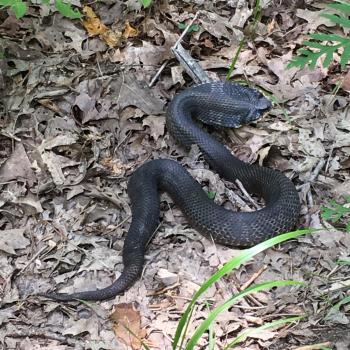Imagine for a moment that you are sitting at the roomy end of an upscale dining table. The temperature of the space is perfect, and, apart from your timely desire to eat, you are ferociously comfortable. On this particular occasion, you experience feelings and happenings that are supernatural. For example, your hunger is infinite (not in a horrifying way, but in a manner not unlike your current desire and need to breathe) and likewise is your ability to eat and enjoy food without pain or repercussion.

Now, envision being served your favorite meal alongside that of a stale, but decent-looking, cracker. The availability of your most desired menu item is endless; it will continue to be there—like the five loaves and two fish—to match your endless desire to dine. And, for a time, you enjoy this dish without interruption or modification, never choosing the cracker in place of it.
Until, suddenly, after having consumed your favorite food for a while, and taking immense pleasure in its goodness, you reject this delicious endless meal for a single lightly-salted square.
Difficulties Concerning the Fall
This imagined scenario is one that seeks to paint—in meager, but potentially helpful strokes—a certain philosophical problem that faces those who ponder the doctrine of the Fall of Man.
How could the first humans, Adam and Eve, after basking in the brilliance of God’s goodness, choose the forbidden fruit, an evil masquerading as an ontologically lesser good? While the serpent’s false promise of becoming like God might seem like a fitting explanation (that such a promise could be mistaken for a higher good), there are more questions that must be considered before one proceeds to the next theological difficulty.
For one, if the original couple existed in a state of initial righteousness and pre-fall perfection, why weren’t they perfectly trusting of God? Why didn’t they trust that God’s law ensured their enjoyment of the highest Good, the blissful state of savoring Him and His benefits in absolute paradise forever? Further, after experiencing the topmost Good, which is God, for a season (or even an instant), wouldn’t everything else seem frivolous and unworthy? Isn’t it reasonable to think that an unmediated relationship with, and experience of, the Lord untarnished by sin—like that experienced by Adam and Eve—would naturally have such a gravitational pull that everything in opposition to it would appear obviously tasteless and uninspired?
Perhaps a complete answer to this set of questions is too difficult to craft; perhaps it is unanswerable on this side of the great divide—perhaps I should get to the point.
In what follows, I have not attempted to offer a comprehensive solution to the problems posed above (To do this, at the very least, the nature of freewill would need to be brought into the equation. Which I have not done.). Instead, I have compiled the thoughts of two brilliant theologians from the early centuries of the Church regarding this matter; in this two-part series, I will begin with Maximus the Confessor and conclude with Basil the Great.
Maximus the Confessor (580—662) and a Proposed Solution
“[Christ] came to make plain to our nature the very beauty for which it was created in the beginning and in which it was thoroughly secure. He came to trample the wickedness into which, through deceit, our nature unnaturally fell at the instant it was created, thus depleting its whole potential.” [i]
“When God created human nature, he did not create sensible pleasure and pain along with it; rather, he furnished it with a certain spiritual capacity for pleasure, a pleasure whereby human beings would be able to enjoy God ineffably. But at the instant he was created, the first man, by use of his senses, squandered this spiritual capacity—the natural desire of the mind for God—on sensible things. In this, his very first moment, he activated an unnatural pleasure through the medium of the senses.” [ii]
According to Maximus, an early medieval theologian, a solution to our problem can be found in the very instant of humanity’s creation—and only there. How can a sinless person deny the highest Good after having experienced it first-hand? Maximus suggests that, in a certain sense, Adam denied this Good before he could experience it; during the initial moment of his existence—and rather than enjoying the Lord’s creation as a method of worshipping Him—the first man directed his heart (perhaps only briefly) away from God and towards temporal pleasures for their own sake.
This allowed for the possibility of man choosing a lesser good, or even something contrary to the Good. But Adam did not rebel at this earliest of stages; instead, he allowed the seed of defiance to take root in his heart. This granule of potential evil grew there and weathered the Goodness that God showered upon Adam for a time; until that moment when mankind’s desire for self and darkened pleasure gushed out, forming the first sin and humanity’s subsequent fall from primal perfection (or potential perfection).
Maximus and the Meal
Now let’s return once more to the metaphor above. The option put forth by Maximus is akin to the following addition: When in the scenario you are served both dishes, the favored meal, and the cracker, suppose that you take a quick glance at the stale square before even looking at your preferred dish. This plants a small, yet budding thought into your brain, and throughout the duration of time in which you enjoy your favorite food this idea grows. “Maybe I am missing something by neglecting the cracker? Sure, it didn’t look like much when I saw it, but maybe I am being deceived by its meager appearance? It is quite probable that this item could benefit me in some manner of which I am currently unaware.”
These internal suggestions then prompt you to neglect your favored meal and reach for the cracker. Of course, like nearly all metaphors that seek to explain theological complexities, the “meal” cannot give an exhaustive description of Maximus’ reason for the Fall; nevertheless, I think it is helpful.
Although, I would like to add—in order to give a more accurate portrayal of the Confessor’s assertion—that the favored meal in the metaphor should be imagined as being so delectable that, after tasting it, one would not even consider that another food could be as gratifying (which is obviously analogous to God’s Goodness in the creation narrative).
Final Remarks
How Adam’s initial turning from God to sensible things actually (or could have) played out is altogether bound to the realm of speculation. Simply put, the original human must have enjoyed aspects of creation in ways that did not truly affirm creation’s place as inferior and subservient to its Creator; and this—even after the introduction of the highest Good—eventually snowballed into Adam’s self-absorption and sin. Of course, this just raises more questions, including those regarding the “perfection” of a pre-fallen humanity, but let’s not concern ourselves with these just yet.
Please check out my next post on this topic, where I explore the thought of Basil the Great and offer a few more comments concerning this fascinating subject.
[i] Maximus, and Paul M. Blowers. On the Cosmic Mystery of Jesus Christ: Selected Writings from St. Maximus the Confessor. Crestwood, NY: St. Vladimir’s Seminary Press, 2003, 85.
[ii] Ibid., 132.












